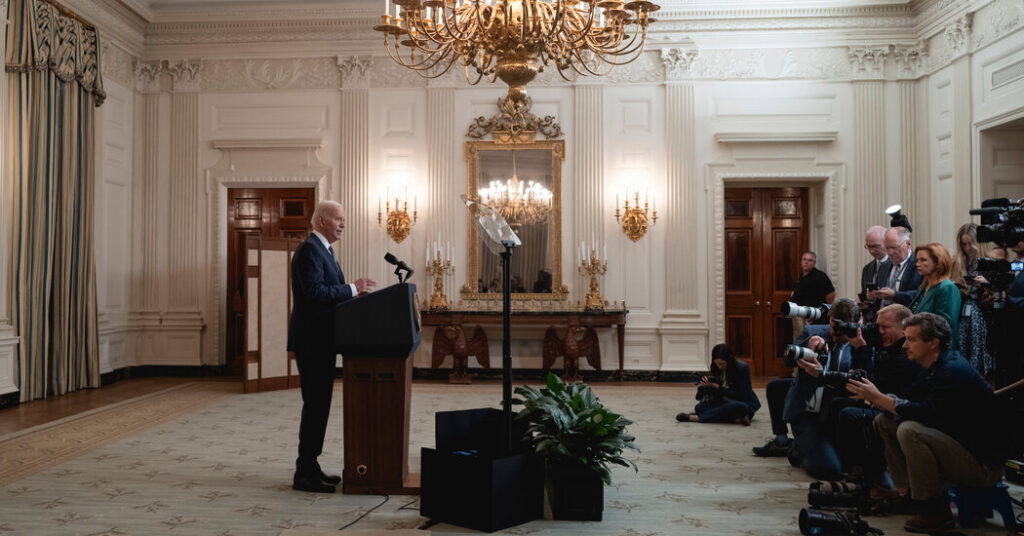Friday’s remarks were Mr. Biden’s first public comments about the war since an Israeli strike and subsequent fire on Sunday killed at least 45 people, including children, and wounded 249 in an encampment for the displaced, according to Gazan health officials. A visual analysis by The New York Times found that Israel used U.S.-made bombs in the strike, forcing the White House to face difficult questions over American responsibility for rising death toll.
Mr. Biden said on Friday that he saw the “terrible images” from the deadly fire.
“The Palestinian people have endured sheer hell in this war,” Mr. Biden said after describing the pain of those whose relatives were “slaughtered by Hamas terrorists on Oct. 7” and the “anguish” of Israeli families waiting for hostages to be released.
Mr. Biden also said too many innocent people had been killed in Gaza, “including thousands of children,” and addressed the many Americans who are infuriated over the way his administration has handled the conflict.
“I know this is a subject on which people in this country feel deep passionate convictions,” Mr. Biden added. “So do I. This has been one of the hardest, most complicated problems in the world. There’s nothing easy about this.”
In describing the four-and-a-half page Israeli proposal, Mr. Biden said it would be broken into three phases. The first would begin with a roughly six-week cease-fire, the withdrawal of Israeli forces from populated areas of Gaza and a release of elderly and female hostages held by Hamas, in exchange for the release of hundreds of Palestinian detainees. Mr. Biden said there were still details that still needed to be negotiated to move on to the next phase — apparently including how many Palestinians would be released in return for each freed Israeli hostage.
In the second phase, as described by a senior administration official who briefed reporters after Mr. Biden spoke, all the remaining Israeli hostages would be released, including male soldiers. All hostilities would end, and, the official said, all Israeli forces would withdraw from Gaza. In the past, Mr. Netanyahu has publicly rejected a complete withdrawal, maintaining that would result in a resurgent Hamas, once again in control of the territory.
It is unclear, from the description given to reporters in the briefing, who would govern the territory, though in the past the United States has said that would most likely be the Palestinian Authority, which has struggled to run the West Bank.
In the third phase, the remains of hostages who have died would be exchanged, rubble cleared and a three- to five-year reconstruction period would begin, backed by the United States, Europe and international institutions. But that plan sounded almost aspirational, given the level of destruction and the near-famine conditions.
Mr. Biden, however, portrayed this road map as reasonable — if the terrorist group goes along. “As long as Hamas lives up to its commitments, a temporary cease-fire will become, in the words of the Israeli proposal, a cessation of hostilities permanently,” Mr. Biden said.
American officials said they believed that following the meeting in Paris last weekend between William J. Burns, the C.I.A. director, and David Barnea, the head of Israel’s Mossad spy agency, Israel made significant concessions on the hostage talks. Those included reducing the number of live hostages they required to be released in the early phase.
Still, a person briefed on the matter said the negotiations were “on pause” while Israel conducts its operation in Rafah.
Mr. Biden has also been involved in the hostage talks, even though he has not traveled for any of the negotiating sessions. Mr. Biden’s role, officials said, has been most notable in the pressure he has put on Mr. Netanyahu to continue to negotiate and reduce Israeli demands.
But on Friday, Mr. Biden was clearly focusing his pressure on Hamas, arguing that taking this offer was their best shot at ending the war and moving toward a cease-fire.
“Everybody who wants peace now must raise their voices,” Mr. Biden said, adding that the public should let Hamas leaders “know they should take this deal. Work to make it real, make it lasting and forge a better future out of the tragic terror attack and war.”
Aaron Boxerman contributed reporting from Jerusalem, and Julian E. Barnes from Washington.


